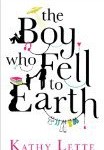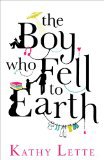Five words from the blurb: autistic, son, challenging, quirkiness, family
Ten years ago I loved reading Kathy Lette’s books, but my reading tastes changed and I didn’t think I’d be tempted to try her again. Then I received an email from her publicist in which I was informed that Kathy Lette’s new book was a big departure from her previous novels and was written based on her experiences with her twenty one-year-old son who has Asperger’s syndrome. Always keen to read books on the subject, I agreed to give it a try.
The Boy who Fell to Earth centres on Lucy and Jeremy, a fictional couple who have an autistic son called Merlin. Unable to cope with the demands of a special needs child Jeremy leaves and Lucy finds herself alone, battling with authorities to achieve the best results for her son.
The first half of the book annoyed me. I know that all parents of special needs children have difficult days and experience a whole range of emotions, but the negativity of the opening chapters was over powering. A lot of the content didn’t ring true when compared to my recent experiences of the NHS/local schooling system. I can’t decide if this is because Kathy Lette is basing this book on her experiences from twenty years ago or because she is more familiar with the Australian schooling structure (or both!) but I can reassure any parents with children recently diagnosed with autism that things are far better than this book makes out.
There was no mention of the National Autistic Society and the central character made no effort to understand her son’s way of thinking. This meant that she spent her whole life tormenting the poor child, who would have probably been easy to look after if she’d made a few small changes in the way she communicated with him.
I was also frustrated by the way the way she continually moaned about mainstream schooling, but then rejected her in-law’s offer of £300,000 to privately educate him. She seemed to want sympathy more than solutions and her cycle of negativity drove me mad.
The writing was light and easy to read, but the chatty style and endless punchlines became tiring after a while. Perhaps I’m just too close to the subject matter, but I didn’t find some of the jokes very funny.
One thing I learnt in my three years of disastrous dating is that when Cupid closes one door…he slams another in your face. Who knew that Asperger’s was sexually transmittable? But it must be, judging by the way men bolted at the first glimpse of Merlin.
Luckily, things improved as Merlin aged and I found the descriptions of him as a teenager far more enjoyable to read. Their relationship had stabilised and they seemed to have a far better understanding of each other. Lucy continued to do annoying things, but I had a bit more tolerance for her.
The ending almost made up for the earlier sections. It was beautifully written, moving and poignant.
So now I’m torn. I want everyone to read the ending, but I can’t recommend the first section. The only solution is for everyone to read this as part of a book group. It will provoke lots of discussion and give people a greater knowledge of autism. Perhaps the excessive negativity will lead to greater sympathy for us parents?

.

